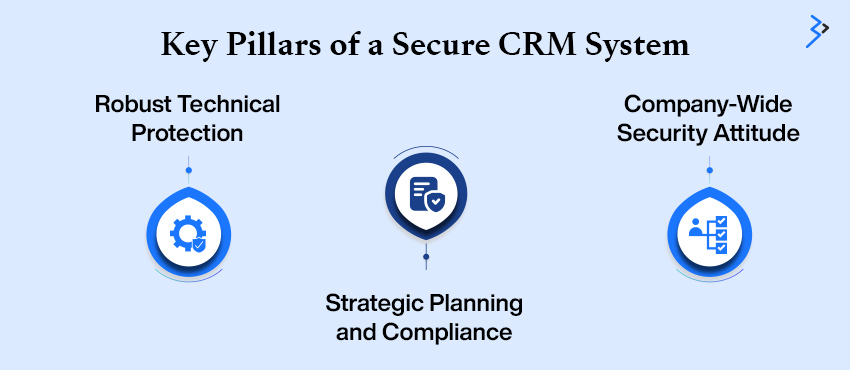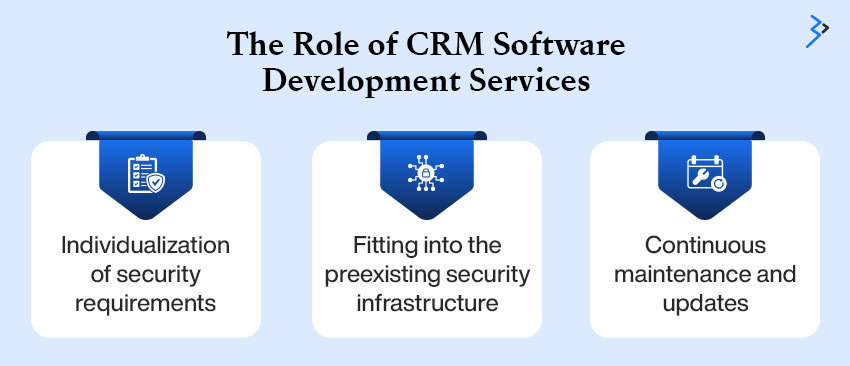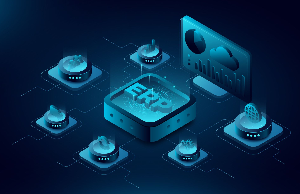In the current business scenario, there are many ways to involve customer data, which has become the lifeblood of a business. Such data helps in creating personal customer experiences, sales, and relationships.
However, along with such tremendous value comes an equally immense responsibility: the need to protect such information. A customer Relationship Management (CRM) system meant to serve as the single point of contact with all customers is as good as it is secure. Secure CRM systems are in the spotlight, with very few doubts about them as the non-negotiable building block of trust and long-term growth.
The recurrence of data breaches does not necessarily characterize the environment in which businesses operate nowadays. Still, often, an event and regulatory scrutiny have never been as high. That is why strong security in your CRM is not simply a technical spec, but a strategic requirement that directly affects reputation, loyal customers, and profits.
Customer Data: The New Gold and Its Vulnerabilities
Consider customer data as an endowment of a digital type of gold. Sadly, it is immensely privileged, desirable, and a good victim to bad players. This gold mine contains all the names, addresses, contacts, purchase histories, preferred modes of communication, and even sensitive financial or health information.
When managed correctly, this abundance of data can enable companies to get to know their customers and predict their needs to provide personalized experiences that would make them loyal.
But then, the sheer amount of data and its sensitivity make such data a significant liability unless it is secured. Data breaches well illustrate the vulnerability. In its 2024 Cost of a Data Breach Report, IBM revealed that the cost of a data breach worldwide has grown to USD 4.88 million, which is 10% higher compared to the preceding year and is the most significant increase since the breakout of COVID-19.
An alarming 46% of all breaches involved customer Personally Identifiable Information (PII), which indicates the extent to which this asset is targeted on many occasions. These are not abstract numbers; they translate into monetary loss, legal complications, and decaying business reputation.
Why Security is Paramount in CRM
Customer data is the core of every company and is often stored via CRM customer data management systems. The place where the sales track the conversation, marketing brings audiences together, and the service teams use crucial history. The knock-on consequences of the collapse of this central hub can be horrendous.
In addition to government fines and lawsuits, there is the long-term effect of losing customers’ trust. A survey done by Research Gate showed that 75% of the people who were surveyed lost trust in companies after a data breach. On the same note, Salesforce attests that 84% of consumers are more loyal to a company with reasonable security measures. This is because it is clear that customers do not just demand protection; they demand those businesses (business owners) that prioritize it.
That’s why customer data must be collected securely and smartly in CRM. Reliable CRM system development services ensure your CRM is functional and resilient to breaches.
The regulatory landscape further raises the stakes.
According to the International Association of Privacy Professionals (IAPP), as of early 2025, data protection laws now cover approximately 79% of the global population—underscoring a near-universal shift toward privacy-first digital environments. GDPR fines have already exceeded €4 billion, with the highest single penalty at €1.2 billion in March 2025. HIPAA penalties in the U.S. can range from $137 to over $2 million annually.
Working with expert CRM software development services helps organizations stay compliant while building trust. Privacy isn’t optional in today’s digital economy; it’s a competitive differentiator.
Key Pillars of a Secure CRM System

An adequate CRM protection does not rely on innovative one-shot security measures; it is an ongoing, multi-layered type of protection. It first requires robust technical protection, tactical planning, and a company-wide security attitude.
An excellent example of a CRM system is equipped with encryption of data at rest (data at rest) and data in motion, so that sensitive CRM customer data management is not only secured, but in case it is used and it should not be accessed by the particular record stated. Role-Based Access Control (RBAC) is essential in restricting access according to the roles of users. An example would be that a sales rep can see contact and purchase history, whereas more sensitive financial or health data would be restricted. This is a fundamental aspect of CRM system development services, whereby those involved can only access data.
Also, audit logs assist in tracing changes, deletions, accesses, and the generation of reports, each of which is associated with a user and clock time. This audit trail is essential in identifying suspicious activity, conducting event investigations, and ensuring compliance with necessary regulations. Movement in real-time also allows the security team to detect unauthorized access or conduct automatic checks.
In addition to internal security, periodic penetration testing and third-party security audits enable the detection of vulnerabilities in advance. Good CRM customer information maintenance will similarly recommend conformity with regulations, such as GDPR, CCPA, and HIPAA, including breach notice.
While CRM hardening is essential, many breaches start on employee endpoints via phishing or infected downloads. Equipping staff devices with free antivirus software from Bitdefender adds real‑time malware, ransomware, and web‑threat protection without cost, reducing the chance of credential theft that leads to CRM compromise. Pair endpoint protection with MFA and RBAC to create a layered defense.
In implementing cloud-based CRM platforms, the vendor’s security status must be reviewed regularly. This is because, as far as collecting customer data in CRM is a root business process, it directly affects the level of risk that your company is exposed to as a result of the security architecture of your CRM.
Read More – Top 10 Open Source ERP and CRM Systems
How Secure CRM Enhances Business Operations
Although risk mitigation is the key mission of secure CRM, its advantages go a long way beyond that. A safe environment is a source of enhancement and operational greatness. First and foremost, it creates and sustains customer confidence.
In a time when 71% of customers claim they would cease transactions with an organization in case their sensitive information was mismanaged (McKinsey, as quoted by Secureframe), being able to prove just how seriously committed a company is towards information protection, particularly data security, can be a potent differentiator.

Customers are more likely to share their data when they are assured it is safe and, as a result, can offer more personalized experiences at a higher brand loyalty rate. A safe CRM safeguards it against the expenses incurred because of data loss, continuity in the business, and adherence to regulatory requirements.
It also increases data quality, such that analytics could be accurate, customer segmentation could be achieved better, and decisions could be made intelligently. The better you manage your customer data in CRM, the more profound your strategic knowledge will be.
Read More – Best Real Estate ERP and CRM Platforms To Use in 2025
The Role of CRM Software Development Services

Such security and functionality in a CRM system may need more than an off-the-shelf solution. And this is where exceptional CRM software development services come in handy. An efficient CRM development firm can customize the CRM to fit the needs of a unique security level, integrate the CRM with the current IT framework, and maintain and update the CRM to combat the changing threat. Such services are not merely an implementation. They involve:
- Individualization of security requirements: Developing client-specific details to accommodate special needs with security compliance or connecting with an expert security system. For example, a healthcare provider would require bespoke encryption protocols or consent management workflows to satisfy the requirements of HIPAA, not all of which may be present in a generic CRM that is purchased out-of-the-box.
- Fitting into the preexisting security infrastructure: The CRM must facilitate a secure communications exchange with firewalls, identity control solutions, and other enterprise security tools. This will be paramount to an orchestrated security position for all your technicians.
- Continuous maintenance and updates: Cybersecurity is an elusive target. With a committed CRM development firm, support is constant, the software fixes the vulnerability, and the system is revised to the current security requirements. This proactive measure is critical because new dangers are constantly surfacing.
The service of a reputable firm specializing in CRM system development services is a strategic business investment in case any company with sensitive customer information wants to implement CRM or upgrade it. Their knowledge is such that CRM can work and become secure by default at the ground level.
Collecting and Managing Customer Data in CRM: Securely and Ethically
Customer relationship is an activity of an organization of customer data that starts by making transparent and ethical data collection in CRM systems. As businesses get consent, they must be explicit about the kind of data being collected, its rationale, and its usage. Input should be done on secure forms, such as encrypted ones.
The next important thing is management vigilance after data capture is made. This entails data retention regulation, accuracy, sufficiently destroying out-of-date documents, and integration protection to impede breaches. Every stage, including collecting customer data in the CRM and the final removal, should contain stringent safety measures to generate credibility and guarantee attentiveness.
The Future is Secure and Customer-Centric
It is no secret that the value of CRM security is on a rising trend. The world is so oriented towards perfection in customer data as an asset, yet a severe liability that companies cannot afford to be slack regarding security.
Digging into creating decent CRM software development services and cooperating with a well-established CRM development company is critical in implementing safe CRM systems that secure vital contents, generate inexplicable customer loyalty, and guarantee coercion within a constantly changing legislative setting.
At Brainvire, we know that the foundation of your customer relations is based on the confidentiality of their data. As one of the biggest CRM software development services in the USA, we engage in the end-to-end development of CRM systems, a much-needed service provider focusing on security at each point.
Our solutions are managed under strong measures, whether in terms of CRM customer data management or beyond. We believe in filling the business with CRM systems that are not only powerful and efficient, but also inherently secure, so that you can grow without worrying about anything.
FAQs
CRM systems hold highly valuable customer data. Breaches can lead to massive financial losses, legal penalties, and a severe loss of customer trust, making robust security absolutely paramount.
A secure CRM relies on encryption (data at rest and in transit), strict access controls, detailed audit trails, regular security audits, and built-in features to ensure compliance with data protection laws.
Secure CRM systems simplify compliance with regulations like GDPR and HIPAA by providing features for consent management, data retention policies, and robust audit trails that demonstrate adherence to legal requirements.
Effective CRM customer data management ensures data quality, integrity, and adherence to privacy regulations throughout the data lifecycle. It involves secure collection, storage, use, and eventual deletion of customer information.
Engaging CRM software development services ensures the CRM is custom-tailored to specific security needs, integrates seamlessly with existing infrastructure, and receives ongoing maintenance to address evolving cyber threats, going beyond off-the-shelf solutions.
Related Articles
-
How Can CRM Be Used For Business Purposes?
Customer Relationship Management or CRM software is a near-vital tool for businesses at every level. Business owners have extensively recognized the role of CRM software as it imbibes multi-functionality into
-
How An Integrated ERP System Seamlessly Unifies Different Systems Within Your Business
A successful business decision relies on data collected from different aspects of business within the company and data obtained from customers, suppliers, and business partners externally. However, consolidating and managing
-
Integration of Adobe Commerce Cloud and Odoo POS for an Omnichannel Experience
As technology improves, we find more and more ways to use it in our everyday lives. As a result, the barriers between what we do online and in real life




